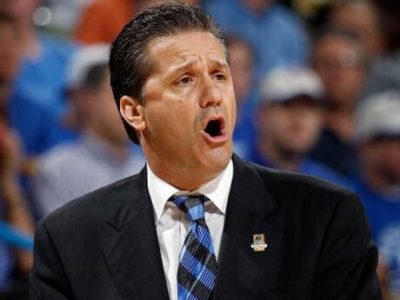The Kentucky Wildcats captured their first national championship in more than a decade earlier this week. And they did so in a style unconventional to the college basketball world.
Three of the Kentucky’s four leading scorers were freshman, including NCAA Tournament Most Outstanding Player Anthony Davis. And after their magical one-year stint in Lexington, they’ll all likely declare for the NBA.
Entering their college careers, players like David and Michael Kidd-Gilchrist and Marquis Teague are one-year rentals for John Calipari. Unfortunately, it’s becoming the norm, and it’s hurting the sport.
If kids are spending a year in college just to kill time before they can officially get a paycheck for playing ball, then forget it – go directly to The Association.
Why put a roadblock in their way? Sure, everyone deserves an education, but two semesters in college is nothing to write home about. Their freshman year is a chance for coaches in a win-now mode to make a run in The Tournament, and allows the NBA to market their future stars.
But why should the NBA prosper while college basketball suffers? Players who circumvented high school and darted straight to the pros usually work out just fine. Cough, LeBron James, Tracy McGrady, Kobe Bryant. And if they truly don’t want to go to college, they spend a year in Europe and then declare for the NBA Draft.
And if they truly don’t want to go to college, they spend a year in Europe and then declare for the NBA Draft. Either way, it’s proving the one-and-done rule pointless – just a stepping stone until they reach their ultimate destination.
Instead, the NBA and NCAA should look to embrace the college basketball experience. The two parties should institute the same policy utilized by the NFL and college football. Go ahead; call it the three-and-done rule.
After three years in college a player is more educated, more experienced and both leagues can benefit. Not only will kids have an opportunity to graduate, they’ll have a professional career right in front of them.
And honestly, if you spend three or four years playing on your college hoops squad, the game will return to its era of prominence. Once again, veteran squads will compete for championships and fans will finally be able to remember players’ names.

With news that NBA Commissioner David Stern is contemplating adding another year to the rule, Dallas Mavericks owner Mark Cuban came out this week and bashed the one-and-done rule. And in typical Mark Cuban fashion, he said only fans in Lexington support it. "I just think there's every good reason to [wait three years after high school to become draft-eligible], which is obviously why we didn't do it."
We’re getting too accustomed to the new wave of college hoops stars – the Derrick Roses, the John Walls, the Kevin Durants, the Michael Beasleys. One year in college, one run in the Big Dance and done.
A new policy would return us to college hoops at its best. Dwyane Wade’s triple-double lifting Marquette past top-seeded Kentucky to the school’s first Final Four in 26 years. Duke’s Grant Hill, Bobby Hurley and Christian Laettner winning back-to-back national titles over Kansas and The Fab Five. And behind some young, energetic coach named Jim Valvano, “The Cardiac Pack” upset the sport’s Goliath behind a buzzer-beating dunk.

If Calpari keeps his word and remains Kentucky’s coach, he’ll likely replenish his freshmen with another crop of elite high schoolers. He’s already secured the second-best recruiting class in the nation, with the top two players still considering committing to coach Cal.
A three-year rule might allow us to see one of the best college basketball teams for the next three or four years. But instead, like their predecessors, they’ll probably flee for the pros after a year. And for us fans, we’ll be left wondering, “What if?”



















